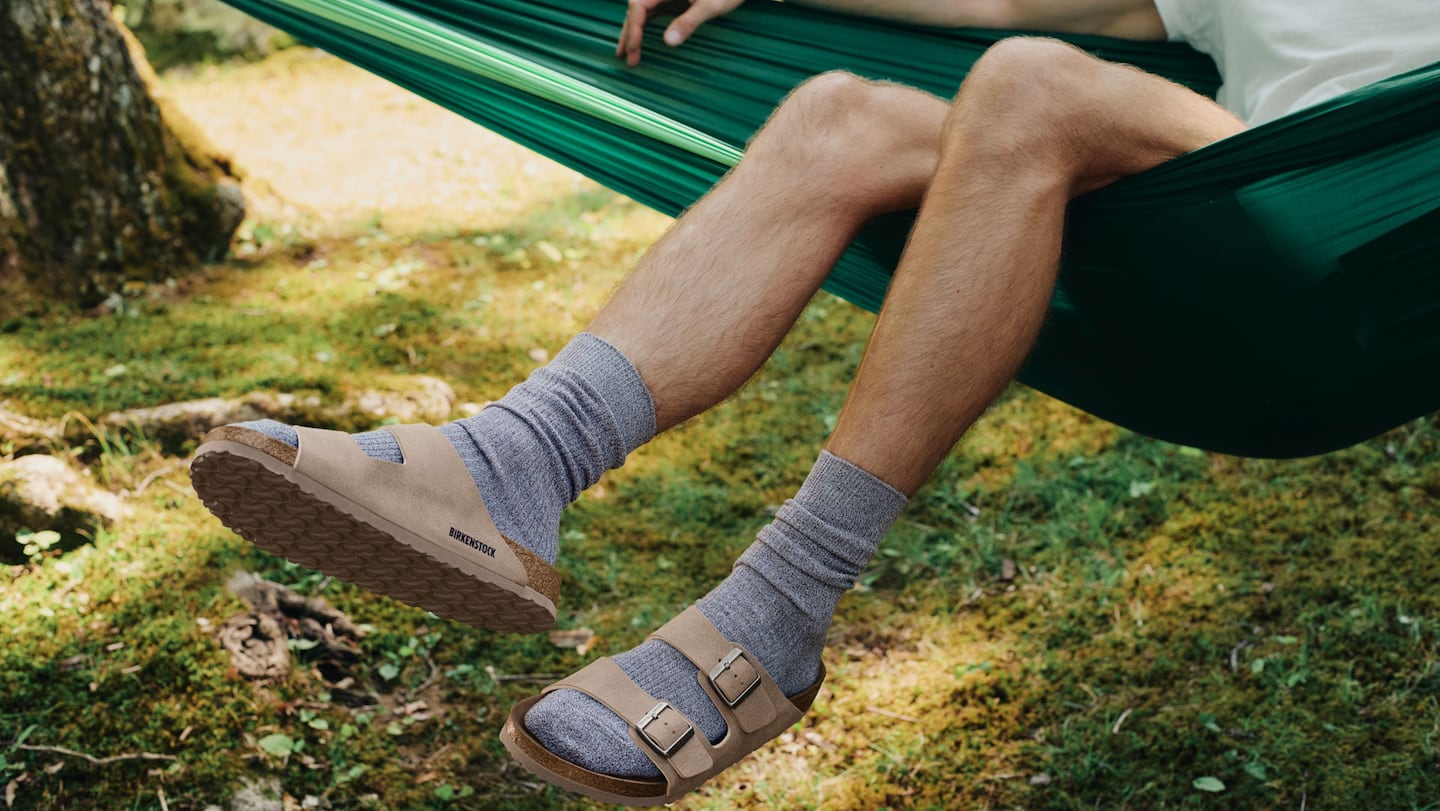
The Business of Fashion
Agenda-setting intelligence, analysis and advice for the global fashion community.

Agenda-setting intelligence, analysis and advice for the global fashion community.

The verdict on Birkenstock’s initial public offering: right company, wrong time.
The 277-year-old German sandal-maker’s stock was initially priced at $46, roughly in the middle of its expected range. But its value promptly dropped as shares began trading, ending the day down 12.6 percent at $40.20. Birkenstock ended the day with a market capitalisation of about $7.5 billion, still a hefty premium over the €4 billion ($4.3 billion) L Catterton paid for the brand in 2021. But that figure is below pre-IPO projections of up to a $10 billion valuation.
Birkenstock itself is widely seen as a strong brand on a hot streak, with rising sales boosted by luxury collaborations, the post-pandemic trend toward comfort-meets-fashion and even a cameo in the Barbie movie. But that wasn’t enough to overcome broader uncertainties around the health of the global economy, and the ability for wealthy consumers in the US and other big markets to keep splurging on pricey sandals.
“There are just a lot of concerns regarding the consumer segment,” said Jessica Ramirez, retail analyst at Jane Hali & Associates. “We’ve heard from a number of retailers that the second half of the year is tough, and holiday sentiment isn’t exactly high in the US market.”
ADVERTISEMENT
The frosty reception for Birkenstock’s shares is also a discouraging sign for other IPO hopefuls, including Arc-teryx-owner Amer Sports, which has filed for a public listing, and Kim Kardashian’s Skims, which is rumoured to be exploring that option.
Birkenstock’s underwhelming performance caught many market watchers by surprise. It was the first major IPO by a fashion brand since Lanvin in December. But other consumer brands, including the restaurant chain Cava and makeup brand developer Oddity Tech had seen shares pop earlier this year.
The thinking was that Birkenstock, bigger and better-known than either of those companies, would perform similarly. It generated sales of €1.24 billion ($1.3 billion) in 2022 — nearly double its 2018 revenue, with adjusted earnings before interest, taxes, depreciation and amortisation, of €434.6 million ($461.5 million).
The performance of those other IPOs should have been a warning sign in retrospect. Oddity’s shares have lost about a third of their value since their July debut, while Cava’s are down about 20 percent. More recent IPOs have performed similarly, with grocery delivery service Instacart erasing its 40 percent post-IPO surge by the end of its second day of trading.
The unenthusiastic reception has less to do with any individual company and more signals unease toward retail as a whole, analysts say. Consumer spending in the US has stagnated in recent months, and a number of mass brands have reported cooling sales. The day before Birkenstock’s IPO, LVMH reported slowing growth, causing investors to wipe nearly $300 billion off the value of luxury companies worldwide.
Wider market volatility hasn’t helped. Investors worried about China’s property market, inflation in the US or the geopolitical aftershocks of the conflict between Israel and Hamas are less likely to bet on an IPO.
“We have two major wars going on right now and who knows what kind of pressures that puts on the economy,” said Janet Kloppenburg, retail analyst behind JJK Research Associates.
Birkenstock was expected to be the first in a series of fashion brands and retailers to go public in the coming months. Those companies may have longer to wait now.
ADVERTISEMENT
The fact that a blue-chip company with fast-growing sales and fat margins struggled to hold investors’ interest doesn’t bode well for start-ups that haven’t yet turned a profit, or established brands that don’t have the same cultural clout.
Even so, Birkenstock’s trajectory could very well pivot as trading continues. Brands eyeing IPOs, including Skims and fast-fashion giant Shein, will be scrutinising Birkenstock’s performance in the coming weeks. Potential macroeconomic tailwinds such as moderate retail growth, a robust holiday season and inflation relief could cause the IPO market to unthaw in a matter of months. Under more favourable conditions, it’s not unlikely that another fast-growing brand like Skims would outperform Birkenstocks in its prospective public listing.
Not much, in the short term at least.
Birkenstock has the kind of cultural recognition and fashion cachet of which most brands can only dream. Popularised in the 1960s by hippies and outdoor enthusiasts and then rediscovered in the 1990s, Birkenstock underwent another transformation in the early 2010s when the shoes were embraced by fashion insiders and luxury brands. A watershed moment was when Phoebe Philo featured fur-lined Birkenstock-lookalike sandals in her Spring/Summer 2013 collection.
Since then, Birkenstock has collaborated with the likes of Rick Owens, Stüssy and Dior, endlessly iterating on its hero products through partnerships, new materials and colourways, as well as expanding its assortment to over 700 styles. According to its own survey, 70 percent of existing customers in the US have purchased at least two pairs of Birkenstocks.
“It’s hard to picture a growth ceiling for Birkenstock because it’s already proven it can grow outside of core products, but can also make those core products feel energised again and again,” said Ramirez.
Birkenstock’s top-selling Arizona sandal made a brief but memorable cameo in the Barbie movie this summer, effectively cementing its status as not only a footwear staple but also a signifier of the cultural zeitgeist.
As to whether Birkenstock has the longevity to outlive current trends, analysts point to the continued success of Crocs and Uggs, two other comfort-oriented shoe brands that peaked in popularity years ago but have continued innovating through collaborations and category expansion. Both companies’ shares have risen more than 300 percent in the last five years (Ugg is owned by Deckers Brands, which also makes Hoka sneakers and Teva sandals).
ADVERTISEMENT
“You could see a similar pattern here at Birkenstock,” said Kloppenburg.
And if so, investors will likely take note.
After 18 months of hardly any listings on the equity market, a number of fashion brands are now eyeing public offerings in the coming months. A full recovery, however, is yet to be in sight.
The 244-year-old sandal brand is opening its first boutique in the US and will unveil a new online store for collaborations later this year.
L Catterton is reportedly the frontrunner to acquire the original anti-fashion shoe brand, which is reaping the rewards of shoppers’ pandemic-driven desire for casual comfort.

Cathaleen Chen is Retail Correspondent at The Business of Fashion. She is based in New York and drives BoF’s coverage of the retail and direct-to-consumer sectors.
The British musician will collaborate with the Swiss brand on a collection of training apparel, and will serve as the face of their first collection to be released in August.
Designer brands including Gucci and Anya Hindmarch have been left millions of pounds out of pocket and some customers will not get refunds after the online fashion site collapsed owing more than £210m last month.
Antitrust enforcers said Tapestry’s acquisition of Capri would raise prices on handbags and accessories in the affordable luxury sector, harming consumers.
As a push to maximise sales of its popular Samba model starts to weigh on its desirability, the German sportswear giant is betting on other retro sneaker styles to tap surging demand for the 1980s ‘Terrace’ look. But fashion cycles come and go, cautions Andrea Felsted.